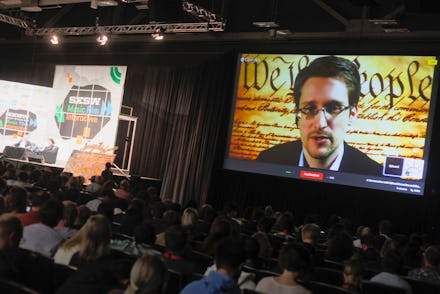It's Hard to Tell if Edward Snowden Is a Liberal or a Libertarian

Is Edward Snowden a freedom-loving Democrat whose crisis of conscience compelled him to act, or a flame-throwing libertarian eager to burn away the modern state in favor of an anarcho-capitalist dystopia?
We should consider the merit of this distinction and whether it exists at all, because Snowden isn't going away. If anything, he's increased his visibility as an anti-surveillance spokesman, appearing at SXSW on Monday to speak to the tech community about what the NSA is doing and how it impacts all Americans:
There were some choice tidbits there that allies and detractors alike might find illuminating. According to Snowden, he had no pretext of advising the government on what course to take. Instead, "What I wanted to do was to inform the public so they could make a decision for what we should be doing."
He also said, "I took an oath to support and defend the Constitution, and I saw that the Constitution was being violated on a massive scale."
Liberals might be disappointed to find he has less strict views on how large corporations should be able to use data: Snowden says, "The government has the ability to deprive you of rights," while corporations "should only collect the data and hold it as long as neccessary for the nature of the business." He noted that citizens have legal options to use against companies, while the government is above the law. All of these talking points could fall into the liberal playbook, but seem somewhat libertarian.
It's that kind of thing, coupled with some very libertarian-leaning points gleaned from Snowden's past, that inspired a frothingly angry take-down of Snowden and other leakers in The New Republic. In that article writer Sean Wilentz argued that some surveillance powers are inseparable parts of the modern state and the true aim of the whistleblowers is to spread libertarian paranoia and discord. "Where liberals, let alone right-wingers, have portrayed the leakers as truth-telling comrades intent on protecting the state and the Constitution from authoritarian malefactors, that’s hardly their goal," wrote Wilentz. "In fact, the leakers despise the modern liberal state, and they want to wound it."
Wilentz, though, must rely heavily on misleading the reader on certain key political points, such as expecting them to accept his contention that the democratic liberal state and the national security state are one and the same. Thus, by his logic, attacking one is attacking the other, and people like Snowden and WikiLeaks founder Julian Assange are tools of sledgehammer-wielding right-wingers eager to dismantle the social safety net, instead of "truth-telling comrades intent on protecting the state."
So a better question might be asking ourselves why this matters. Snowden isn't a politician, pundit or editorialist. If he was, then his beliefs on other topics would matter. Instead, he's a rather single-minded whistleblower who has barely spoken a word about any other troublesome U.S. policies than government surveillance and complicity in human rights violations in the War on Terror. Snowden can't even enter the U.S. or any other nation with a U.S. extradition treaty, otherwise he faces near-certain prison time — perhaps for the rest of his life. Republican Sen. Mike Pompeo (Kansas) went so far as to send a lengthy open letter to SXSW organizers asking them to refuse to give him a platform at all. In this context, it would be vaguely disillusioning for liberals to learn, say, that Snowden wanted to end social security. But it would be endlessly worse for him to have not come forth at all.
Leftists: if Snowden is a libertarian, how does it change the facts of what he's revealed to the rest of us? Or as Ta-Nehisi Coates at The Atlantic suggests, "... we know quite well what 'the leakers' are thinking, but we're much more interested in what the NSA is doing" (like violating our civil liberties and lying to the Senate.) Peter Frase at The Jacobin responded to Wilentz's hit piece by saying that "the attempt to unmask a devious libertarian hidden agenda makes for a satisfying purity politics" but mostly serves those who would mask their own inaction with a holier-than-thou mentality.
Bickering over Snowden's politics is a pointless distraction from the challenge of fighting the security state, and plays right into the hands of its defenders.